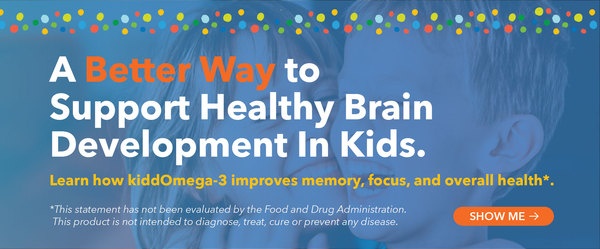.jpg?width=750&name=clinical-support-for-childrens-supplements%20(1).jpg)
By Dr. Matt Hand
The traditional food pyramid has long been outdated, but the way most Americans view their daily nutritional intake hasn’t changed.
Even with a USDA “Choose My Plate” diagram, most will agree that it’s hard to implement this guideline even when preparing home-cooked meals, especially if you have dietary restrictions such as a gluten-free or vegan diet.
With the overall macronutrient and micronutrient content of foods produced in the U.S. and an increase in refined sugar, there has been a displacement of nutrient-dense foods with calorie-loaded, nutrient-poor processed meals¹.
Why Supplementing Your Child’s Diet Is Important
Parents with even the best of intentions may be surprised to learn that the food they buy for their children lacks valuable micronutrients that act as co-factors in the brain, affecting everything from neurologic function to emotional processing. Since children don’t have the cognitive ability to always make the right decision to eat nutritious foods, it’s up to the parents and the child’s pediatrician to identify what is missing and utilize supplements to ensure proper dietary needs are met.
Supplements are not all created equal, and this is even more apparent when looking at the types of children's multivitamins we have on the market today. Most of them are covered in sugar and contain very little of the actual vitamins and minerals parents are looking to add to their children’s diets. This misleading information leads parents to mistrust the value that high-quality supplements can provide in supporting the healthy development of their child’s brain, body, and immune system.


How to Ensure Your Child Is Getting Enough Nutrients
One study published in Pediatrics found that of the 3,370 participants aged 2-19, just 30% of them met the recommended range for fruits, grain, meat, and dairy and 36% for vegetables. 16% of youth did not meet any recommendations, and only one percent met all the recommended daily allowances.² These results indicate that the majority of children do not get anywhere near the required amount of nutrients from their diet alone.
Omega-3
Omega-3 fatty acids are essential nutrients most abundantly found in fish, nuts, and seeds. They play a crucial role in cell membrane structure as well as making hormones that regulate inflammation and the myelin sheath that acts as a neuroprotectant.*³
A study published in Neuropsychopharmacology looked at the effects of omega-3 supplementation on boys aged 8-14 with and without attention challenges. Results from this study found that omega-3 supplementation improved inattention in both groups of boys, suggesting that omega-3 fatty acids may be beneficial in healthy brain development.*4
The recommended amount of omega-3 for children between 1,000 mg and 1,600 mg per day, yet the standard over-the-counter gummies supplement contains a dose of only 50 mg per serving. At this rate, a child would need to consume an entire bottle in one day to get the immune system and brain health-boosting effects of omega-3, specifically eicosapentaenoic acid (EPA) and docosahexaenoic acid (DHA) fatty acids.*
Zinc
Zinc is a mineral found in a variety of foods including red meats, legumes, shellfish, seeds, nuts, dairy, and whole grains. We rarely see these foods in the diet of young children who prefer to reach for brightly colored packets of processed junk food and starches.
But zinc is vital for the healthy development of reproductive organs, the brain, and the immune system.* Low levels of this element adversely affect the development and function of cell-mediated innate immunity as well as the adaptive immune response.
Due to the importance of the dietary intake of zinc, researchers have looked at the combined effect of zinc with iron and magnesium in children with attention challenges and found that those with symptoms also exhibited lower plasma concentrations of all three minerals when compared to children without these unique conditions.*5
Iron
Iron is another mineral that may be hard for children to get naturally through their diet, as most will avoid eating iron-rich foods such as legumes, liver, spinach, and shellfish.
A 2014 study found that low levels of iron may explain as much as 30% of the severity of attention challenges in certain children.6 Iron deficiency is the most common nutritional deficiency, affecting 20-50% of the world’s population.7 Additional research has confirmed that low levels of iron can lead to impaired development of cognitive functions8.
Magnesium and Vitamin D
Magnesium and vitamin D go hand-in-hand, as magnesium is a necessary component for the conversion of vitamin D to its active form. This, in turn, supports calcium absorption required for healthy bone growth and development, especially in children.*
Magnesium is also a natural gamma-aminobutyric acid (GABA) agonist, a neurotransmitter responsible for promoting deep sleep, which is imperative for proper energy restoration, tissue repair, and growth.*
Striking the right balance between supplementation and dietary nutrients can be challenging, but it’s necessary for healthy bone growth, cognitive development, and a healthy immune system.*
With the ever-increasing prevalence of processed foods over the last few decades, parents are frustrated at having to decipher the nutritional content of every child-labeled product. Parents who want to understand the value of high-quality supplements should have a thorough discussion with their child’s integrative health practitioner or pediatrician, who can answer specific questions related to the child’s developmental needs.
*These statements have not been evaluated by the Food and Drug Administration. This product is not intended to diagnose, treat, cure or prevent any disease.








.jpg?width=750&name=clinical-support-for-childrens-supplements%20(1).jpg)





-1.jpg)
-1.jpg)




